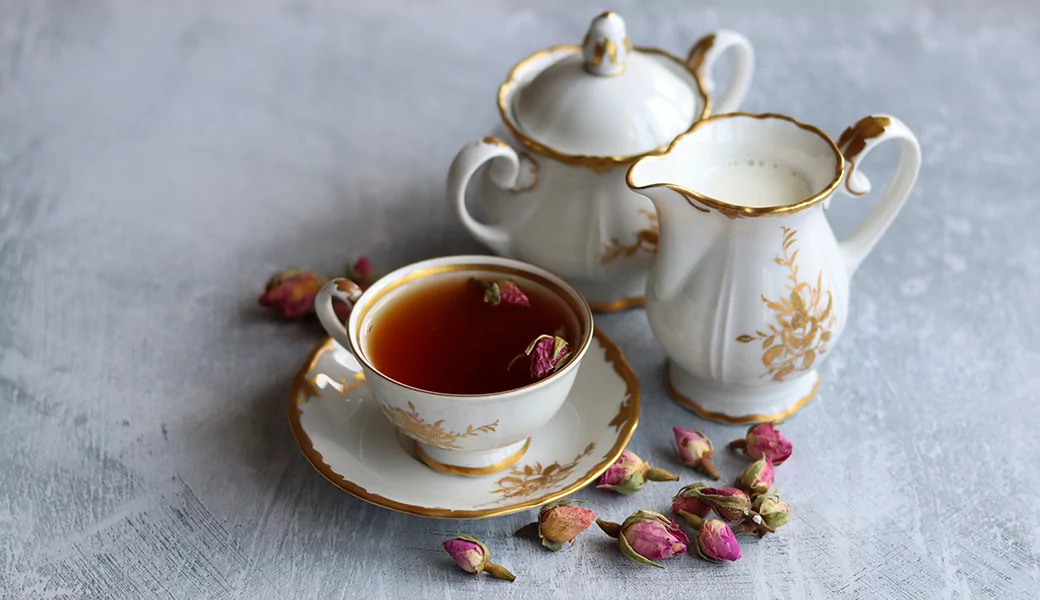How black tea is beneficial and why it stands unrivaled

For many years, scientists have been exploring the health benefits of black tea. Their research has revealed that this beloved daily beverage contains a broad spectrum of beneficial compounds. The specific composition of black tea plays a crucial role in its health benefits. Discover more about these scientifically-proven advantages in this article.
Composition of black tea
The chemical composition of black tea can be divided into two categories: insoluble and soluble substances. While the insoluble substances influence the appearance of the tea leaf, they do not affect the taste, color, or health benefits of the tea. Therefore, we will focus on the soluble substances that contribute to the qualities of this globally cherished beverage. So, what comprises the world's most popular drink.
Antioxidants
They include flavonoids and flavonols (such as epicatechin, gallocatechin, epigallocatechin, epigallocatechin gallate, kaempferol, quercetin, and myricetin), as well as theaflavins and thearubigins, which are unique to black tea. Antioxidants are responsible for the flavor of the drink and contribute significantly to its health benefits. Thearubigins also give the infusion a reddish-brown color.
Amino acids
The key soluble substance in black tea is L-theanine. This amino acid imparts a naturally sweet flavor to the tea and is renowned for its pronounced relaxing properties.
Alkaloids
In black tea, theine (tea caffeine), theophylline, and theobromine are key contributors to its effects. While black tea contains less caffeine than coffee, it has more than some other types of tea, which helps to enhance cognitive function. Theobromine, another compound in black tea, works to dilate blood vessels, supporting cardiovascular health, while theophylline benefits the lungs.
Saponins
These substances not only contribute to the tea's ability to foam when brewed but are also noteworthy for their antibacterial properties.
Tannins
They are responsible for the characteristic tartness and astringency of black tea. The benefits of strong black tea for the body are also related to tannins: they have an antibacterial effect.
Micro- and macronutrients
In tea, you will find a variety of essential elements beneficial for health. Key minerals present include magnesium, manganese, potassium, calcium, phosphorus, iron, iodine, and fluorine, among others.
Vitamins
The vitamins that are most prevalent in tea include B1, B2, PP (also known as niacin), A, K, and E.
Proven health benefits of black tea
Vigor, productivity and brain health
Thanks to theine (tea caffeine) and L-theanine, black tea is an excellent choice for boosting mental performance. Together, these two compounds help achieve a state of calm while enhancing focus and concentration. They also support memory, improve cognitive performance, and may offer protective benefits against Parkinson's and Alzheimer's diseases.
Good sleep and stress tolerance
Surprisingly, black tea can actually improve sleep quality, thanks to its L-theanine content. This amino acid helps you relax more quickly and effectively, particularly after a stressful day. To reap these benefits, it's important that the tea is not too strong and is not consumed right before bedtime, as drinking it right before sleep could disrupt rest.
Stable blood pressure, healthy heart and strong blood vessels
In black tea, the balance between tea caffeine and theobromine creates a unique effect: while tea caffeine can raise blood pressure, theobromine works to lower it smoothly. This harmonious interplay allows individuals with both high and low blood pressure to experience lasting improvements in their well-being, often for several hours, unlike the shorter effects seen with green tea or coffee.
Additionally, black tea's saponins and flavonoids contribute to heart health by lowering cholesterol levels and providing protection to the heart and blood vessels.
Healthy stomach and good digestion
Black tea is especially effective at maintaining healthy gut flora, surpassing other types of tea in this regard. It promotes the growth of beneficial bacteria while inhibiting harmful ones, reduces inflammation with its antimicrobial properties, and helps alleviate symptoms of nausea. This makes it particularly beneficial during recovery from digestive issues, such as a pancreatic "breakdown" or poisoning. However, it is important to consult your doctor before using it as a remedy.
Immune protection and anti-inflammatory effect
Like other classic teas, black tea is rich in a variety of antioxidants. While it may not contain as many as less-fermented varieties, it still provides significant health benefits. Tea flavonoids, present in black tea, enhance immunity—including gut health—reduce inflammation, and offer protective effects against cancer.
Top 7 latest studies proving the benefits of black tea
- In 2022, British scientists found that people who drank at least two cups of tea daily had about a 13% lower risk of mortality. About half a million respondents participated in the study, which was conducted over 11 years.
- In 2021, experts from Poland proved the ability of tea polyphenols to prevent and slow the development of heart disease. One and a half million people were involved in the study.
- In the same year, Chinese scientists found that drinking black tea reduced the risk of dementia and stroke.
- In 2020, Hong Kong experts published a study proving the importance of polyphenols for gut health.
- In the same year, the Iranians also pleased: the results of their research indicate the ability of black tea to reduce high blood pressure.
- In 2019, the results of a study made public by Indians: it was found that black tea polyphenols may be useful in anti-cancer therapy.
- In 2018, Pakistani scientists confirmed that theaflavins and thearubigins are excellent helpers in the fight against high cholesterol as well as high blood sugar.
Which black tea is considered the best
The choice of tea is always a matter of personal taste. For many black tea enthusiasts in Russia, the preference often leans toward teas made from whole leaves. Nevertheless, certain varieties are widely regarded as benchmarks and cherished around the globe. These classic teas, renowned for their distinct qualities and flavors, set the standard in the world of black tea.
The following best-selling blends can be highlighted in the RICHARD® collection:
- Royal Kenya is a highland Kenyan tea with floral and fruity notes in the flavor.
- Royal Ceylon is a highland Ceylon tea characterized by sweetness in the aftertaste and moderate strength.
- Royal English Breakfast is a classic tea bouquet with a tart flavor and bright aroma.
How many cups of black tea you can drink a day
Doctors generally consider 400 mg of caffeine per day to be a safe limit for most healthy individuals. One cup of black tea typically contains up to 80 mg of caffeine, depending on its strength. This means you can safely enjoy up to five cups of black tea per day. However, it is important to account for caffeine from other sources, such as coffee or chocolate, to avoid exceeding the recommended daily limit.
What to add to black tea to make it even better
If you drink tea in reasonable amounts, it will serve you well. And traditional additives can make it even healthier.
Benefits of black tea with milk
There is a belief that tea with milk is more than just a drink—some even consider it a meal. This notion holds some truth, as the addition of milk makes the beverage more caloric, potentially satisfying both thirst and hunger. Moreover, it enriches the drink with valuable micronutrients, including vitamins and minerals.
If you do not have issues with lactose intolerance, regular cow's milk can be added to your tea. For those who are lactose intolerant, plant-based alternatives such as almond or oat milk are excellent options. For a delightful tea with milk, the tart and flavorful Royal English Breakfast is an ideal choice, complementing the creaminess of the milk perfectly.
Benefits of black tea with lemon
Black tea is not as rich in vitamins as green or white tea, so adding lemon to it is a great idea. Adding a slice of citrus to your mug will provide a boost of vitamin C, offering a guaranteed pick-me-up and a good defense against viruses. In addition, lemon tea can help with pregnancy nausea or motion sickness. To prevent citric acid from affecting the stomach, drink such tea after meals.
Benefits of black tea with ginger
Ginger is an even more potent source of vitamin C than lemon, and it also provides essential vitamins B1 and B2, which support the nervous system and enhance overall well-being. Rich in valuable essential oils, ginger helps combat germs, while its key compound, gingerol, imparts the distinctive bite and boosts metabolic processes. For the best results, add ginger to your tea only if you are enjoying it on a full stomach, much like with lemon, to fully appreciate its benefits.
Benefits of black tea with sugar or honey
Sugar often has a dubious reputation due to its caloric content and the strain it can place on the liver and pancreas. Nonetheless, there are times when a touch of sweetness can be quite beneficial, such as when you need a quick mental boost or an energy surge. In these instances, pairing black tea with a bit of sugar can be an excellent choice.
For those who prefer a healthier option, honey is a superb alternative. It offers a host of benefits, including enzymes, natural antibiotics, and a variety of antioxidants.



